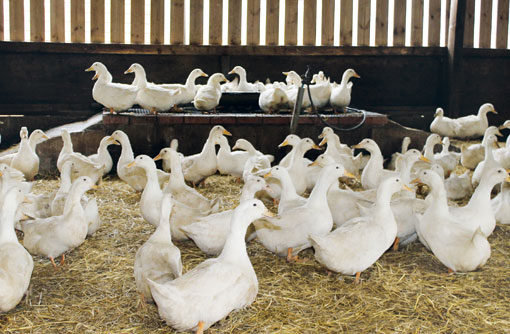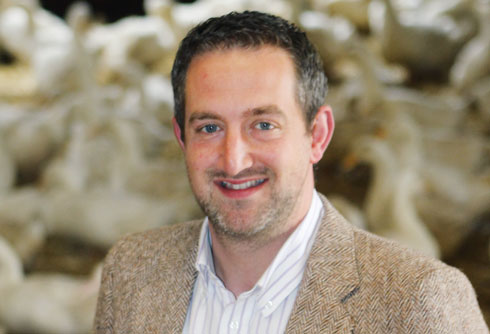Watercress Lane launches franchise initiative

Would-be duck egg producers have an opportunity to “hit the ground running”, following the development of a new franchise agreement by Norfolk Watercress Lane.
Launched as a business just five years ago, the company has seen steady sales growth, with laying duck numbers increasing from about 8,000 in 2008 to a total flock size of 40,000, including parent stock.
These are all housed in open-sided barns on the home farm at Mattishall, though there are also two satellite farms nearby. All these eggs are collected by hand daily – about 33,000 of them – and returned to the pack room for washing, drying, printing and boxing.
Much of the growth of the business has been attributed to the development of a unique quality assurance scheme and a strong brand identity.
“Unlike hen eggs, there are almost no rules and regulations when it comes to producing duck eggs, so we’ve had to develop our own,” says Watercress Lane sales manager Gavin Fisher. “As we are producing a food source, we look to provide our customers with safety, traceability and knowledge.”
The launch of the Blue Duck mark in 2010 was intended to do for duck eggs what the Red Lion mark has done for hen eggs, acting as a guarantee of quality.

Watercress Lane sales manager Gavin Fisher.
This has been instrumental in driving the growth of the business, with a widening customer base. “We started off selling to egg merchants and farm shops, but are now into local retailers, restaurants and specialist food shops in London.”
The company also has a seasonal contract to supply eggs to P&O Ferries and is negotiating with supermarkets.
“I’m always wary of growing too quickly,” says Mr Fisher. “I’ve seen too many firms do that and then come unstuck. I prefer to see steady growth, building the foundations first.
“But we’ve now got to the point where we’ve built the business up in Norfolk and Suffolk and are getting customers from a wider geographic area. It would be a struggle to service them all from here, so we are looking to set up franchises in different parts of the country.”
The model that has been developed with consultants Franchise Development Services Ltd aims to guarantee consistency of product and service, without being overly prescriptive.
“We’re looking for people with the same attitudes as us, with a similar ethos. Having the right set up is important, but having the right personnel is crucial.”
Blue Duck Franchise Ltd has been set up with this in mind. “It gives people the chance to hit the ground running,” says Mr Fisher.
For an initial outlay of about £20,000, franchisees will be able to tap in to the knowledge base that the management at Watercress Lane have built up over the years. “From bird welfare and production to sales and distribution, franchisees will have access to all they need to know without making costly mistakes.”
The package of support includes initial training and advice on things like biosecurity, bird welfare and office management. “We can also help franchisees save money by advising on equipment purchases, and we have some purchasing power for things like feed.”
But perhaps the greatest benefits relate to access to the Blue Duck brand and all the marketing advice and materials that go with it. “We have a really strong story to tell and a name that makes the job of selling relatively easy,” says Mr Fisher.
“We want to work with the franchisees to assist in their sales, pointing them towards initial customers, then working together as a team to see what works and what doesn’t, so we can grow the market for duck eggs even further.”
Mr Fisher says that it is important the Blue Duck Franchise works for all parties. “Unlike some other franchises, we don’t want to handcuff people. We do want them to follow our procedures, but if we’re too domineering, we hinder the chances of finding the people we want.”
The new franchise does require a five-year commitment and there will be additional capital purchases for would-be investors – they will have to provide all the housing, egg handling and distribution equipment. And of course there are the ducks themselves, which will have to come from the Watercress Lane hatchery with a minimum flock size of 4,000-5,000.
Mr Fisher believes the franchise they have developed strikes the right balance. “We’ve had to learn a lot, and have made mistakes along the way,” he says. “But we’ve now got a name for ourselves and feel ready to use that to take the business to the next level.”
| What the franchise offers |
|---|
| Knowledge – share the experience of Watercress Lane’s management |
| Support – from training to biosecurity and marketing advice |
Purchasing power – better deals achievable through group purchasing |
Brand – a recognised and respected product |
Stationary – from checklists to point-of-sale material |
Sales – unique selling points and key account assistance |
| Business development – co-operative approach to growth and management |
| * A full prospectus is available from Blue Duck Franchise Ltd, including full costings. |
Duck production
Duck welfare is a high priority at Watercress Lane, with all the birds housed in open-sided barns in groups of about 300. The barn system is believed to offer the ducks a greater sense of security and better welfare than free range.
The buildings are totally cleansed between flocks, then bedded down with straw for the new arrivals – hatched in the farm’s own hatchery. This bedding is topped up three times a week.
Water is provided in raised troughs, feed is specially formulated for optimum performance and open-faced nest boxes are provided at ground level.
Birds are vaccinated against salmonella and the eggs are tested every month. Productivity is currently running at 85%.
The entire system is self-contained, with parent flocks maintained to provide the next generation of layers. Each flock reaches “end of lay” at 70-80 weeks, and are then generally re-housed with smallholders rather than culled.
